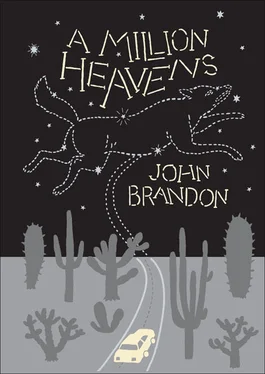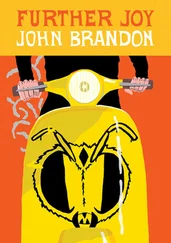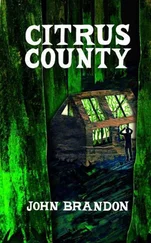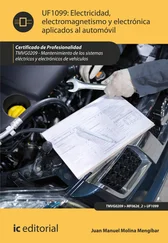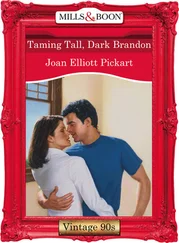Dannie drove them back to Lofte and when they arrived at the condo she said she was supposed to meet an old friend for coffee back in town. She told Arn she’d be home late. He looked at her puzzled but he didn’t protest. He went inside and Dannie pulled onto the road and went all the way down to Route 66. She wanted to feel free and aimless. She wanted Arn to be the one sitting at home and wondering.
She drove without thinking, hitting the likely spots. She was supposed to be talking about how plants and animals survived in this harsh habitat, but her mind was full of what had come in the mail the day before. She was going to Las Cruces. There wasn’t anything for her to do in Las Cruces until the summer, but she was going right away. She was going to lose two weeks of rent, and so be it. She was going to pack her old Subaru to the gills and aim it south on I-25 and not stop until she saw a sign that read NEW MEXICO STATE UNIVERSITY.
This would be her very last desert safari. She had one guest in the jeep, an old guy who was in great shape, who looked like he could still play football or build a barn. His hands weren’t knotty. He sat placidly as she motored them across a flat of sagebrush.
“It’s okay if we don’t see javelinas,” the man said. “Don’t worry yourself.”
She looked at him in the mirror. They’d seen roadrunners and woodpeckers and hummingbirds and several rodents and a big scorpion, but still no javelinas.
“I like the scenery,” the man said. “The scenery is enough.”
“Oh, you’re going to see a javelina,” said the guide.
The man waited. He wore a bright gray jacket the same color as his hair.
“My insurance policy,” the guide told him. She popped open the glove box and removed a gallon-sized zipper-bag of sweet rolls and cantaloupe. “I don’t leave it up to chance. When the little suckers hear the Jeep they’ll run out and meet us. There’s one that’s bigger that sort of leads them.”
“Lucky pigs,” the man said. “Better breakfast than I had this morning.”
The guide downshifted for a hill and when they crested it she and the old man saw all the light pouring into the valley before them, casting long shadows behind the cacti and behind the carcasses of dozens of miniature hogs. The guide let the Jeep roll halfway down the slope and then held the brake to the floorboard. There was hardly any blood. Some of the creatures’ snouts were pointing straight up in the air. They didn’t look surprised or scared. They looked as helpless as they’d always looked. The guide could smell the animals. They weren’t rotting yet; this was how they always smelled. The buzzards had not yet arrived. This was the guide’s last day in the basin, thank God.
She looked over into the old man’s steely eyes and could feel that her own were moist. He put his hand on her shoulder. All he said was, “Jesus, sis, sorry about your pets.”
She had been flat on her back on her bedroom floor, had sensed another song on the way and had stilled herself in order to let it arrive peacefully, but then she’d heard her mother out in the living room talking to someone. She got herself up and went to the hallway to listen. Concerning her mother, this was what she’d been reduced to — spying. Cecelia had never gone back to getting her mother up in the mornings, and her mother seemed to be managing that on her own, rousing herself at a reasonable hour with no help. Maybe Cecelia was doing the right thing, leaving her alone. She needed space. She didn’t need an enabler or a critic. Maybe Cecelia’s uncle was a good influence. Cecelia made her mother feel guilty, but Cecelia’s uncle could talk to her mother as a fellow over-the-hill half-depressed person. Cecelia didn’t feel sorry for either of them — someone they loved had died, just like had happened to Cecelia — but her life would be a lot easier if her mother got better.
From down the hall Cecelia could see her mother’s stiff, dull hair hanging over the back of the wheelchair. Her mother was ordering something over the phone but she was watching the church channel, not a home shopping channel. Cecelia heard the TV, the guy with the shiny beard and the headset who’d once been penniless but had depended on faith and had been rewarded with a corporation. Cecelia’s mother was telling the person on the other end of the phone that she felt her faith multiplying in strength.
“Now where is your organization based?” Cecelia’s mother asked.
Cecelia didn’t know what to do. She could hear the central melody of the new song in her head. It sounded like one of those lullabies that could fill adults with fear. Cecelia felt weird at how not weird it felt to her now, receiving the songs. It was a vested condition of her life. Each song could reasonably be deemed a miracle, and to Cecelia each was only an interesting chore. She wasn’t missing Reggie on her own terms, but nothing ever happened on her terms. She listened to her mother ask question after question. Something was off. The conversation didn’t seem friendly. Cecelia’s mother was asking questions about where exactly her money would end up and she wasn’t getting an answer. Cecelia saw a tiny insect bumbling across the wall and she didn’t disturb it. She shifted so it could pass. Here came her own voice trilling in her head. Here came the lyrics, something about praying for a drought. She tried not to hear them.
“Money is no object,” she heard her mother say. “I have a great deal of money.”
Cecelia knew that wasn’t true. It seemed like her mother was getting transferred, working her way up the ranks of holy telemarketing. She still wasn’t getting answers. She wanted to know that her donation would help people in need. Cecelia’s legs were starting to ache. She was hearing the chorus now. If I can’t take your hand for a dance, there ain’t no Egypt, there ain’t no France .
“Does it feed orphans?” Her mother was almost yelling. “Or does it buy your boss a speedboat?”
Cecelia saw now. She got it. Her mother was prank-calling them, harassing them. Cecelia had never heard of a person engaging in solitary pranking and she’d never heard of a fifty-year-old woman prank-calling anyone at all. She ought to be relieved, Cecelia supposed. Her mother wasn’t brainwashed. Her mother still had her spunk. Maybe, when she thought no one was around, she allowed herself moments as her old self. Or maybe her and Cecelia’s uncle were turning back into the early-twenties punks Cecelia used to hear stories about. Cecelia didn’t care if she wasn’t the one capable of helping her mother, as long as someone did.
The religious people were trying to get her off the phone and Cecelia’s mother wasn’t going quietly. She was still claiming to want to donate a large sum, a sum they’d finally become convinced she didn’t have. She wanted to sow a significant financial seed, she kept insisting.
Cecelia slipped back in her room and finished getting dressed, still hearing Reggie’s song, which was telling her that missing people was a way of giving yourself the sour rewards you deserved. And how else could it work? Cecelia was missing Reggie but she was also missing herself as she’d been when Reggie was around. She was missing having a place in the world, because a world without Reggie didn’t seem to want her.
She went out the front door without a sound, her mother more or less in a shouting match now, about to get hung up on. She had an afternoon shift in the booth at work. She drove fifteen over the whole way and jogged in from the parking lot and arrived only a couple minutes late.
She opened the door to the A/V booth and there was her boss, sitting in Cecelia’s chair. Her boss held up a finger. She was reading a young adult novel, as she was known to do. It appeared from the cover to be about zombie cheerleaders. No one knew if she herself preferred this brand of literature or if she liked to screen whatever her children were going to read. No one knew if she even had children. No one knew a thing about the woman. She got to the end of a chapter and snapped the book closed.
Читать дальше
